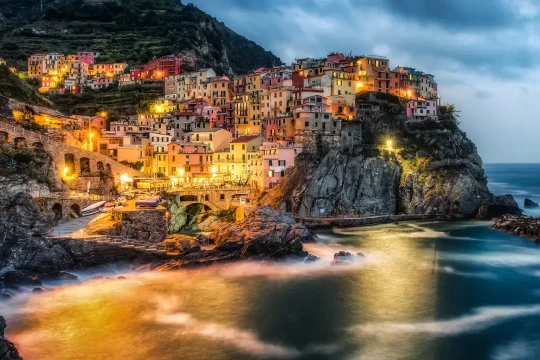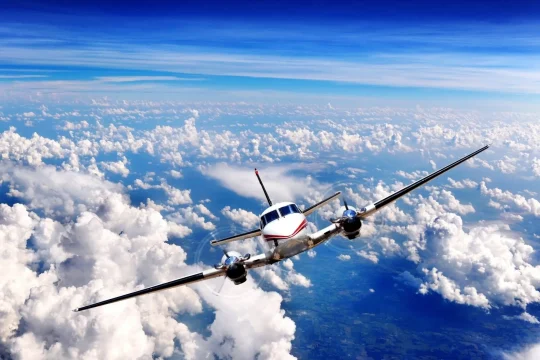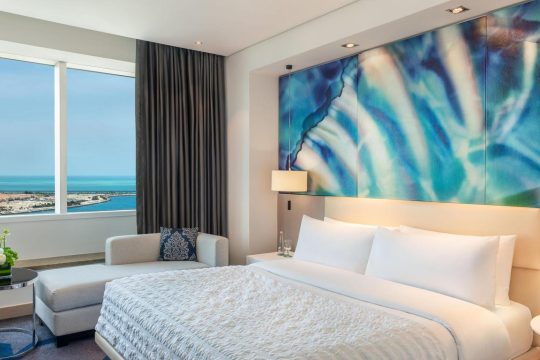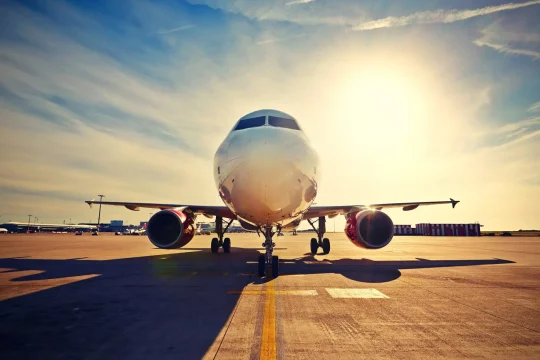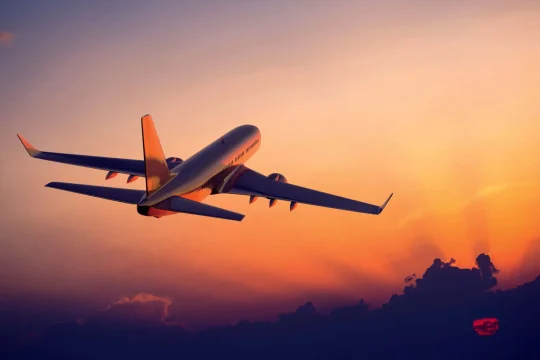Travel Glossary
Your expectations, our limitations
- Accommodation – A place where travelers can sleep and rest, such as hotels, hostels, and vacation rentals.
- Adventurer – A person who enjoys traveling to unfamiliar or dangerous destinations to explore, often with an element of physical challenge.
- Airport Code – A three-letter code assigned to airports, such as JFK for John F. Kennedy Airport in New York.
- All-Inclusive – A type of travel package that includes accommodation, meals, drinks, and often activities for a fixed price.
- Ancillary Services – Additional services offered by airlines or travel companies, like baggage handling, seat selection, or onboard meals.
- Adventure Tourism – A type of tourism that involves activities that are physically challenging and require an element of risk, such as mountain climbing, rafting, or bungee jumping.
- Airport Lounge – A private area in an airport where travelers can relax, enjoy snacks, and access amenities such as Wi-Fi before their flights.
- Airport Shuttle – A transport service that takes passengers between the airport and nearby hotels, car rental locations, or other points of interest.
- Airline Alliances – Agreements between multiple airlines to cooperate on flights, making it easier for passengers to book connecting flights and access a broader range of destinations.
- Archaeological Tourism – Travel focused on visiting historical sites and ruins of ancient civilizations, such as the pyramids of Egypt or the Mayan temples in Central America.
- Auto-tour – A self-guided road trip or driving tour, typically involving multiple stops at different destinations, with the freedom to explore at one’s own pace.
- Airport Security – The security procedures that passengers must go through before boarding a flight, including bag checks, body scans, and identity verification.
- Air Travel Insurance – A specific type of insurance designed to cover risks associated with flying, including cancellations, delays, or medical emergencies during the flight.
- Air Charter – A service that allows individuals or groups to rent a private plane or jet, usually for a specific journey or special occasion, rather than flying commercial.
- Adventure Travel Insurance – A type of insurance specifically designed to cover risks associated with adventure sports or high-risk activities like scuba diving, mountaineering, or bungee jumping.
- Agritourism – A form of tourism that allows visitors to stay on farms, participate in farming activities, and learn about rural life, agricultural practices, and food production.
- Augmented Reality Tourism – The use of augmented reality (AR) technology to enhance the tourist experience, such as providing interactive guides or historical reconstructions of sites through a smartphone or AR glasses.
- Airport Lounge – A private, comfortable area in airports where travelers can relax before their flight, often offering amenities like snacks, drinks, Wi-Fi, and comfortable seating.
- Accommodation Type – Refers to the different categories of lodging available to travelers, such as hotels, hostels, resorts, inns, bed and breakfasts, and vacation rentals.
- Adventure Travel – A niche form of tourism that involves exploration or travel to remote, often challenging locations, with activities such as hiking, trekking, climbing, or extreme sports.
- Airport Shuttle – A shared, often budget-friendly transport service that takes passengers between an airport and their accommodation or other destinations.
- Arrival Gate – The designated gate at an airport where passengers disembark from their flight after landing and are typically greeted by friends or family or proceed to baggage claim.
- Airport Transfer – The service that transports passengers between the airport and their accommodation, often provided by taxis, shuttle buses, or private vehicles.
- Airline Alliances – Partnerships between multiple airlines that allow them to coordinate schedules, share services, and offer passengers more route options and benefits like reciprocal loyalty programs.
- Aviation Security – The measures put in place to ensure the safety and security of air travel, including screening passengers, luggage, and cargo for prohibited items and threats.
- All-Inclusive Package – A travel package where the price covers most, if not all, of the travel costs, including flights, accommodations, meals, drinks, activities, and sometimes excursions.
- Autonomous Travel – Travel made possible by self-driving vehicles, drones, or autonomous airplanes that do not require human intervention or a pilot for operation.
- Airport Lounge – A designated area at airports where passengers can relax, enjoy refreshments, access Wi-Fi, and take advantage of additional services while waiting for their flight.
- Adventure Cruise – A type of cruise designed for travelers seeking more active and adventurous experiences, such as exploring remote destinations, kayaking, hiking, or wildlife encounters.
- Ancient Wonders Tourism – Tourism focused on visiting the Seven Wonders of the Ancient World, such as the Great Pyramid of Giza, and exploring other ancient ruins and historical landmarks.
- Aviation Archaeology – The study and exploration of abandoned or historic aircraft, often involving visits to airfields or museums that preserve aviation history.
- Backpacking – A form of low-cost, independent travel, often involving carrying a backpack and staying in hostels or campsites.
- Basecamp – A central location from which a traveler explores a region or embarks on expeditions.
- Boutique Hotel – A small, unique, and stylish hotel, often characterized by personalized services and a distinctive design.
- Breezeway – A covered passageway between two parts of a building, often found in resorts or large hotels.
- Baggage Claim – The area in an airport where passengers collect their checked luggage after arriving at their destination.
- Budget Travel – Traveling on a limited budget, often involving economical accommodations, transportation, and meals to save money.
- Boutique Cruise – A small, luxurious cruise experience that offers personalized service and exclusive destinations, often aboard smaller ships.
- Bridge Toll – A fee charged to vehicles crossing certain bridges, often applicable on highways or between islands.
- Boutique Travel – High-end, personalized travel experiences tailored to individual tastes and preferences, often including small group tours, luxury accommodations, and exclusive activities.
- Bike Tour – A cycling-based tour that allows travelers to explore a destination on two wheels, often including guided routes or bike rentals.
- Boat Charter – Renting or hiring a boat, typically for personal use or private group tours, for a day or an extended period.
- Bespoke Travel – Fully customized and tailor-made travel arrangements, where the itinerary, accommodation, and activities are designed specifically for the traveler’s needs and preferences.
- Backpacking Tour – A type of travel where individuals or groups visit multiple destinations on a budget, typically staying in hostels or inexpensive accommodations and carrying their belongings in a backpack.
- Bar Crawl – A social activity that involves visiting several bars or pubs in one night, typically in a city known for its vibrant nightlife.
- Business Travel Management – The process of organizing and coordinating business trips, including booking flights, accommodations, and arranging meetings for corporate employees or clients.
- Boutique Hotel – A small, stylish hotel offering personalized service and unique decor, often located in trendy neighborhoods or historical buildings.
- Boutique Hotel – A small, stylish hotel often offering personalized services, unique design, and a focus on delivering a one-of-a-kind experience.
- Bespoke Travel – Custom-tailored travel experiences designed to suit the individual preferences and needs of the traveler, often in the luxury travel market.
- Business Travel – Travel for professional purposes, typically involving meetings, conferences, or client interactions, and often requiring accommodations, transportation, and other services.
- Baggage Handler – An airport employee responsible for loading, unloading, and transferring baggage to and from aircraft, ensuring luggage is safely delivered to passengers
- Backpacking – A form of independent travel that often involves using a backpack to carry belongings, staying in budget accommodations like hostels, and exploring destinations on a tight budget.
- Baggage Claim – The area in an airport where passengers retrieve their checked luggage after deplaning, often marked by conveyor belts and monitored by staff.
- Boutique Cruise – A small, luxury cruise ship that typically accommodates fewer passengers than traditional cruise lines, offering a more intimate and customized travel experience.
- Bunkhouse – A simple, shared lodging facility where multiple guests sleep in bunk beds, often used in budget or rustic accommodations like hostels or camping areas.
- Baggage Allowance – The amount of luggage a passenger is permitted to check or carry on board without incurring additional fees, typically defined by weight, size, and number of bags.
- Business Class – A premium cabin class offered by airlines that provides additional comfort, space, and services compared to economy class, including priority boarding, better meals, and more legroom.
- Baiting Tourism – A controversial form of wildlife tourism where tourists engage in feeding or baiting animals, often to attract them for photo opportunities or in hopes of a close-up encounter.
- Basecamp Tourism – A type of travel centered around visiting a basecamp for expeditions, particularly in mountaineering or trekking, such as the basecamp of Mount Everest.
- Boat-to-Shore Service – A transfer service that brings passengers from a ship or boat to shore, often using smaller boats or tenders to reach coastal areas that are too shallow for larger vessels.
- Blackwater Rafting – A unique type of rafting where travelers navigate rivers that run through caves, often in dark or subterranean environments illuminated only by lights.
- Cabin – A type of accommodation, usually found in rustic or natural settings, such as forest cabins, or on cruise ships.
- Check-in – The process by which a traveler confirms their arrival at a hotel or airport and receives their room key or boarding pass.
- Cruise – A voyage undertaken on a large ship for leisure, usually including stops at various ports of call.
- Cultural Immersion – A travel experience where visitors engage deeply with the local culture, learning about traditions, food, language, and customs.
- Car Hire – Renting a car to travel around a destination independently. Also known as car rental.
- Carbon Footprint – The amount of carbon dioxide emissions produced by an individual’s travel activities, often a focus for eco-conscious travelers.
- City Break – A short holiday or getaway spent in a city, typically lasting a few days and focusing on sightseeing, shopping, and dining.Check-out – The process of leaving a hotel, returning keys, and settling the bill for any remaining charges.
- Couchsurfing – A platform that allows travelers to stay with local hosts for free, typically providing a place to sleep and often offering an opportunity for cultural exchange.
- Caravan – A mobile home or trailer used for long-term travel, often a feature of road trips and camping vacations.
- Cruise Shore Excursion – Optional activities or tours that are offered to cruise passengers when the ship docks at a port of call, such as sightseeing tours, adventures, or cultural experiences.
- Cultural Heritage Tourism – Travel that focuses on exploring the history, culture, and traditions of a specific region, often involving visits to museums, historic sites, and local cultural events.
- Cultural Immersion – The experience of fully engaging with the local culture of a destination, often involving language lessons, participating in local customs, or living with a host family.
- Cruise Port of Call – A port where a cruise ship stops to allow passengers to disembark and explore the local area, often featuring excursions to nearby attractions or activities.
- Cultural Exchange Program – A program where people from different countries or cultures are hosted by families or institutions in another country to exchange knowledge and experiences.
- Cave Diving – A form of scuba diving that takes place in underwater caves, requiring specialized skills, equipment, and training due to the challenging environment.
- Cruise Ship – A large passenger vessel designed for leisure travel, offering various amenities and services, such as dining, entertainment, and shore excursions, often traveling to tropical or scenic destinations.
- Cultural Tourism – Tourism focused on experiencing and learning about a destination’s cultural heritage, including its history, art, music, and cuisine.
- Couchsurfing – A hospitality exchange service that allows travelers to stay with locals for free, often in their homes or on their couches, as a way to experience a destination from a local’s perspective.
- Conservation Tourism – A type of tourism that involves traveling to areas that are focused on environmental preservation, wildlife protection, and sustainability, often contributing to conservation efforts.
- City Break – A short, often weekend trip to a city, typically focusing on exploring cultural sites, dining, shopping, and entertainment, rather than a full-length vacation.
- Carbon Offset – The act of compensating for the carbon emissions produced by travel, often through investing in environmental projects like tree planting or renewable energy initiatives.
- Circular Tourism – A concept where travel experiences are designed to be sustainable and regenerative, ensuring minimal environmental impact and contributing positively to the local community.
- Charter Flight – A flight arranged by a group or organization, typically outside of regular airline schedules, allowing for flexibility in terms of routes, schedules, and aircraft types.
- Cultural Immersion – A travel experience that involves deeply engaging with the local culture, such as staying with host families, participating in cultural rituals, and learning the language.
- Cruise Itinerary – The planned schedule of ports of call, excursions, and activities that a cruise ship follows during its voyage, outlining all stops and timelines.
- Cultural Tourism – Travel focused on exploring a destination’s culture, including its art, history, music, and traditions, often through visits to museums, galleries, or local festivals.
- Cycling Holiday – A vacation where the main activity involves cycling, often organized as tours that explore specific regions or countries, allowing travelers to discover destinations while cycling through them.
- Co-Working Retreat – A travel experience that combines work and vacation, allowing digital nomads and remote workers to collaborate with others in a productive, relaxed setting while traveling.
- Cryptocurrency Travel – A niche form of travel that allows payment for services, accommodations, and experiences using cryptocurrencies like Bitcoin, Ethereum, or other digital currencies.
- Day Trip – A short excursion, typically lasting a day, to a nearby destination for sightseeing or leisure.
- Departure Gate – The area in an airport where passengers board their flight.
- Destination Marketing – The practice of promoting a location or region to attract visitors, including advertising, social media campaigns, and tourism initiatives.
- Downgrade – When an airline or hotel provides a lower class or less desirable service than originally booked, often due to overbooking or availability issues.
- Dromomania – A medical condition characterized by an irresistible urge to travel.
- Duty-Free – Stores located at airports or international borders that sell products without tax or duty charges, often including alcohol, cosmetics, and electronics.
- Destination – A specific place that a traveler aims to visit, such as a city, country, or region.
- Direct Flight – A flight that travels directly from one location to another without layovers.
- Day Pass – A ticket that allows access to a specific venue or service for a single day, such as a spa, resort, or theme park.
- Destination Wedding – A wedding that takes place in a location away from the couple’s home, often in a tropical or exotic destination.
- Digital Nomad – A person who works remotely while traveling, using technology to perform their job from various locations around the world.
- Domestic Travel – Travel within the same country, as opposed to international travel, often less costly and easier to arrange.
- Deep-Eco Tourism – A philosophy of eco-tourism that goes beyond just environmental sustainability to also focus on creating cultural and community-based benefits while minimizing human impact.
- Destination Management Organization (DMO) – An entity responsible for promoting a destination as a tourist destination, coordinating tourism efforts, and developing strategic plans for sustainable tourism.
- Disaster Tourism – A controversial form of tourism where people visit areas affected by natural disasters, wars, or crises, often out of curiosity or to learn about recovery efforts.
- Digital Detox Retreat – A travel experience where visitors disconnect from their devices and the digital world, focusing instead on relaxation, mindfulness, and personal well-being.
- Destination Wedding – A wedding held in a location away from the couple’s home, often in exotic or scenic destinations, where friends and family can travel to join the celebration.
- Double-Entry Visa – A visa that allows the traveler to enter and exit a country more than once during the visa’s validity period.
- Day Pass – A pass purchased for single-day access to an attraction or facility, such as a theme park, spa, or resort, providing access to services for a limited period.
- Destination Marketing Organization (DMO) – An organization that promotes tourism in a particular destination, responsible for advertising, planning, and ensuring the destination is attractive to visitors.
- Digital Nomad – A person who works remotely and travels while doing so, often utilizing technology to work from anywhere in the world, blending travel with professional work.
- Direct Flight – A flight that travels from one destination to another without any layovers or stops in between, although it may involve a refueling stop.
- Duty-Free Shopping – Retail stores located in airports or border crossings where travelers can purchase goods without paying local taxes or duties, often at discounted prices.
- Dromomania – A psychological condition characterized by a compulsion to travel or wander, often used to describe a travel enthusiast or someone with a deep yearning for exploration.
- Day Trip – A short trip taken in one day, usually to a nearby destination or attraction, where the traveler departs in the morning and returns by evening.
- Digital Nomad Visa – A special visa offered by certain countries to attract remote workers, allowing them to live and work from that country for a designated period.
- Desert Safari – An adventure tour through desert landscapes, often involving activities like dune bashing, camel rides, and stargazing under the desert sky.
- Dark Tourism – A type of tourism that involves visiting sites associated with death, tragedy, and historical atrocities, such as concentration camps, battlefields, and disaster zones.
- Destination Marketing Organization (DMO) – An organization responsible for promoting a destination to attract visitors, typically focusing on its attractions, events, and unique offerings.
- Destination Spa – A luxury wellness resort focused on health, relaxation, and rejuvenation, offering services like massage therapy, yoga, and dietary programs to promote well-being.
- Ecotourism – Responsible travel to natural areas that conserves the environment and improves the well-being of local people.
- Excursion – A short journey or trip taken for leisure or exploration, often as part of a larger vacation package.
- Exclusive Resort – A high-end, luxurious vacation destination, often offering private villas, pools, and personalized services.
- Emigration – The act of leaving one’s home country to settle permanently in another.
- E-Ticket – An electronic ticket that allows passengers to board a flight or enter an event without needing a physical ticket.
- Excursionist – A traveler who goes on short excursions as part of their main travel plans, often combining sightseeing and local experiences.
- Eco-Lodge – An environmentally friendly accommodation that minimizes its ecological impact, often using sustainable energy sources and eco-conscious building materials.
- Empty Leg – A flight that is booked for one-way travel, often at a reduced price, as the plane must return to its original location after dropping off passengers.
- E-Visa – An electronic visa that allows travelers to apply for and receive permission to enter a country via an online application process, reducing the need to visit an embassy or consulate.
- Ecological Footprint – A measure of the environmental impact of a traveler, taking into account the consumption of resources, waste produced, and energy used during travel.
- Excursionist Visa – A special type of visa that allows travelers to visit a country for a short period, often specifically for sightseeing or a quick tour, without the intention of staying long-term.
- Expatriate – A person who has moved from their home country to live in another country, often for work or lifestyle reasons.
- Eco-Tourism – Travel that emphasizes environmental responsibility, promoting sustainability and minimizing the negative impacts of tourism on the environment, often including nature conservation and eco-friendly practices.
- Expedited Passport – A fast-track process for obtaining a passport, often for travelers who need to leave quickly or have an emergency.
- Event Planner – A professional who organizes and coordinates various aspects of events such as conferences, corporate meetings, weddings, and large-scale celebrations, including accommodations and travel arrangements.
- Exotic Destination – A destination considered to be unique, unusual, or far from conventional tourist paths, often characterized by distinctive culture, natural beauty, or adventure potential.
- Emirates SkyCargo – The air freight division of Emirates Airlines, which handles the transportation of cargo, including perishables, medical goods, and general merchandise, across international markets.
- Eco-Luxury – A blend of luxury travel and eco-conscious practices, providing high-end experiences that focus on environmental sustainability, such as eco-friendly resorts and luxury safaris with a conservation focus.
- Event Tourism – Travel specifically planned to attend large events, such as music festivals, sports tournaments, or cultural celebrations, often drawing significant numbers of visitors to a destination.
- Ecodome – A sustainable, dome-shaped structure used as eco-friendly accommodation, often constructed using natural materials and powered by renewable energy sources.
- Experiential Travel – Travel focused on immersive experiences rather than passive sightseeing, encouraging travelers to participate in activities that provide deeper insight into local culture and environments.
- Eco-Friendly Accommodation – Lodging that emphasizes sustainability by using renewable energy, eco-friendly materials, reducing waste, and promoting energy conservation.
- Expatriate Travel – Travel undertaken by expatriates, people who live outside their native country, often returning to their homeland or visiting neighboring countries.
- Embassy Assistance – The support provided by embassies to travelers in distress, such as lost passports, medical emergencies, or legal issues while abroad.
- Event Tourism – Travel that is centered around a particular event, such as a festival, conference, or concert, where visitors are drawn to the destination for the event itself.
- E-ticket – An electronic version of a traditional paper ticket, which travelers can use to check in, board, and access services, stored digitally on their phone or computer.
- Ecolodge – A type of eco-friendly accommodation that prioritizes sustainability, using renewable energy sources and minimizing environmental impact while providing a comfortable place to stay.
- Extreme Tourism – Travel that involves high-risk, adrenaline-pumping activities such as skydiving, bungee jumping, or base jumping, designed for thrill-seeking travelers.
- Expatriate Tourism – A form of tourism where individuals travel to live in another country, often for work, long-term stays, or as part of a cultural exchange program.
- Eco-Adventure – Travel that combines adventure activities with eco-consciousness, often involving wildlife watching, hiking, and exploring natural environments while promoting environmental conservation.
- Fly-Boarding – A watersport activity that involves being propelled above the water on a jet-powered board, often associated with beach vacations.
- Festival Tourism – Traveling to attend or experience cultural festivals, such as music, arts, or food festivals.
- Family Suite – A larger hotel room or apartment designed to accommodate families, often featuring multiple bedrooms and extra amenities.
- First-Class Lounge – An exclusive airport lounge reserved for first-class passengers, offering premium amenities such as fine dining, massages, and private spaces.
- Fly-Drive – A travel package that includes both a flight and a car rental, allowing travelers to explore a destination independently.
- Frequent Flyer Miles – Loyalty points awarded by airlines to passengers who fly regularly, which can be redeemed for free flights, upgrades, or other benefits.
- Family-Friendly – Accommodations or destinations that are suitable for families with children, offering amenities and activities for all ages.
- Ferry – A boat or ship that carries passengers and vehicles across a body of water, often used to travel between islands or across rivers.
- Flashpacker – A type of backpacker who combines budget travel with a higher level of comfort and amenities, such as staying in boutique hostels or using upgraded transportation options.
- Flock Tourism – A phenomenon where a large group of tourists visits the same destination at the same time, often resulting in crowded attractions and higher prices.
- Food Tourism – A form of travel centered around exploring a destination’s food culture, including trying local dishes, food tours, and culinary experiences.
- Farm Stay – A type of accommodation where guests stay on a working farm, often participating in agricultural activities and experiencing rural life.
- Fast Track Service – A premium service offered at airports or attractions that allows travelers to skip regular lines for quicker access to check-in, security, or entry.
- Food Truck Tour – A type of culinary tour that involves sampling a variety of foods from mobile food trucks, which often provide a local and diverse array of street foods.
- Floating Hotel – A type of accommodation that is located on water, such as houseboats, floating resorts, or platforms, offering unique and often secluded experiences.
- Frequent Flyer Program (FFP) – A loyalty program offered by airlines that rewards passengers with miles or points for each flight taken, which can be redeemed for discounts, upgrades, or free flights.
- Fly-Drive Package – A travel bundle that includes a flight and car rental, typically for travelers who wish to explore a destination independently.
- First Class – The most luxurious and expensive class of service offered by airlines, featuring the best seats, premium meals, exclusive amenities, and VIP treatment.
- Frequent Flyer Program (FFP) – A loyalty program offered by airlines, where customers accumulate miles or points for each flight, which can be redeemed for free flights, upgrades, and other perks.
- Family-Friendly Resort – A resort designed to cater to the needs of families, offering child-friendly activities, accommodations, and amenities for all ages.
- Flyover Tourism – A form of tourism that involves sightseeing from above, often by helicopter, private plane, or drone, allowing tourists to view a destination from a unique aerial perspective.
- Foodie Tour – A specialized travel experience centered around food, where travelers visit multiple food-related venues, often including local markets, street food, restaurants, and cooking classes.
- Farm-to-Table Tourism – A form of culinary tourism where visitors travel to regions known for their agricultural produce and experience meals made with locally sourced ingredients.
- Fly-Drive Package – A travel package that combines a flight with car rental, allowing travelers to fly to a destination and then have the flexibility to explore at their own pace by driving.
- Floating Market Tour – A tourism activity that involves visiting a market where goods are sold from boats or barges, typically found in countries like Thailand or Vietnam, offering a unique and picturesque shopping experience.
- Glamping – Glamorous camping, where travelers enjoy the outdoors with added luxuries, such as comfortable beds, private bathrooms, and gourmet meals.
- Getaway – A short vacation or retreat, typically used for rest and relaxation.
- Group Tour – A guided vacation package in which a group of travelers explores a destination together, often with an itinerary and shared transportation.
- Green Travel – Travel that aims to minimize environmental impact, such as using eco-friendly modes of transportation and staying at sustainable accommodations.
- Grand Tour – A traditional European travel experience, often undertaken by young aristocrats, that involves visiting major cultural sites across several countries.
- Glacier Hiking – A type of adventure travel that involves walking or trekking on glaciers, often requiring specialized equipment and skills.
- Gastronomic Tourism – Travel focused on exploring a destination’s culinary heritage, often including food tours, cooking classes, and dining experiences at local restaurants.
- Grandparent Travel – Travel experiences designed for grandparents to enjoy with their grandchildren, often involving family-friendly activities and accommodations.
- Glacier Tour – A guided experience that involves exploring glaciers, often with a guide who educates travelers on the formation and history of the glacier, and provides equipment for ice walking or climbing.
- Geotourism – A form of tourism that promotes conservation of the environment and natural resources while fostering economic development, often involving visits to geological sites, landscapes, and ecosystems.
- Greenwashing – A deceptive marketing tactic where companies exaggerate or falsely claim that their products or services are environmentally friendly or sustainable, often used in the travel industry.
- Group Cruise – A cruise trip that is organized for a specific group of people, such as families, friends, or work colleagues, often including coordinated excursions and activities.
- Glamping – A form of luxury camping that combines the outdoor experience with high-end amenities like comfortable beds, electricity, and gourmet meals, offering a more comfortable alternative to traditional camping.
- Guerilla Tourism – A term for tourism that involves a form of ‘unconventional’ or ‘disruptive’ travel, such as surprise pop-up events or spontaneous exploration of non-traditional tourist destinations.
- Group Incentive Travel – A form of corporate travel used as a reward for employees, often including group trips to exotic destinations, team-building activities, and luxury accommodations.
- Geo-Caching – A modern-day treasure hunt where participants use GPS devices to hide and seek containers at specific locations marked by coordinates, often practiced by travelers in the outdoors.
- Glamping – A combination of “glamorous” and “camping,” where travelers stay in luxury tents, yurts, or cabins equipped with upscale amenities like comfortable bedding, private bathrooms, and electricity.
- Global Distribution System (GDS) – A network that allows travel agents, booking websites, and companies to access and book flights, hotels, car rentals, and other travel services globally.
- Grand Tour – A historic travel tradition, especially popular in the 17th and 18th centuries, where young Europeans, particularly British aristocrats, traveled to various European cultural centers to complete their education.
- Group Tour – A structured, organized tour that involves traveling with a group of people, often with a guide, visiting predetermined destinations and following a set itinerary.
- Ground Services – Services that support air travel on the ground, such as check-in, baggage handling, airport security, and boarding processes, as well as transport to and from the airport.
- Gastronomic Tourism – Travel focused on exploring the culinary traditions and specialties of a destination, often involving tasting local dishes, street food, or visiting famous food markets and restaurants.
- Glider Tour – An aerial tour where travelers soar through the sky in a glider, an unpowered aircraft, often in scenic or mountainous locations.
- Geotourism Certification – A certification granted to businesses or destinations that adhere to sustainable practices and promote the preservation of natural and cultural heritage for tourism purposes.
- Green Tourism – A type of tourism that aims to minimize the environmental impact of travel, focusing on eco-friendly accommodations, transportation, and activities that promote conservation and sustainability.
- Host Family – A local family that offers accommodation to travelers, often in exchange for a fee or cultural exchange experience.
- Hiker’s Hut – A simple, often remote shelter in nature designed for hikers, providing a place to rest during long-distance trekking.
- Half-Board – A type of hotel meal plan that includes breakfast and one additional meal, usually dinner, but not lunch.
- Holiday Park – A vacation facility, typically with cabins, lodges, or camping areas, offering recreational activities and amenities like pools, sports facilities, and playgrounds.
- Holiday – A period of time when people take a break from work or regular activities to travel or rest.
- Hostel – A budget-friendly type of accommodation, usually featuring dormitory-style rooms where guests share spaces.
- Hotel Star Rating – A system used to classify the quality of hotels, typically ranging from one to five stars, with five stars representing the highest quality.
- Honeymoon – A vacation taken by newlyweds, often a romantic trip to a tropical or exotic destination.
- Hike-in Accommodation – Lodging that is accessible only by hiking, often found in remote or mountainous areas, offering a more adventurous and immersive experience.
- Holiday Village – A resort or vacation destination that offers a variety of recreational activities and accommodations, typically catering to families or large groups.
- Historical Tourism – Travel focused on visiting places of historical significance, such as ancient monuments, battlefields, or preserved villages and towns.
- Hammam – A traditional Turkish or Middle Eastern steam bath, often part of a wellness or spa experience, typically involving relaxation, cleansing, and exfoliation rituals.
- Hospitality Management – The professional field focused on managing operations in the hospitality industry, including hotels, resorts, restaurants, and other service-related businesses.
- Holiday Park – A type of vacation park, typically offering a mix of cabins, caravans, and camping spaces, along with recreational activities for families, similar to a resort but in a more informal setting.
- Helicopter Transfer – A high-end travel service that uses helicopters to transport travelers quickly between destinations, often used for short trips or transfers from airports to remote destinations.
- Heritage Tourism – A form of tourism that focuses on visiting and exploring heritage sites such as monuments, museums, historical buildings, and cultural landmarks that hold historical significance.
- Hospitality Suite – A special suite or room in hotels or event venues designated for hosting guests, providing refreshments, and offering a comfortable space for informal meetings or gatherings.
- Heritage Hotel – A hotel that is housed in a historic building, often preserving its original architectural features while providing modern amenities for travelers.
- Hotel Hopping – The act of staying in multiple hotels during a trip, often to explore different parts of a city or region, or to experience a variety of accommodations during one vacation.
- Hiking Expedition – A planned and often challenging hiking journey, typically involving extended periods of trekking through rugged terrains, mountains, or remote wilderness areas.
- Hot Air Balloon Ride – A unique form of aerial travel where travelers experience a slow, scenic flight in a hot air balloon, often over picturesque landscapes such as valleys, vineyards, or ancient ruins.
- Helicopter Tour – A guided aerial tour conducted in a helicopter, offering breathtaking views of cities, mountains, or other scenic landscapes.
- Heritage Trail – A pathway or route that highlights historical or cultural landmarks, allowing travelers to explore and learn about the heritage of a region or city.
- Honeymoon Travel – Special travel packages designed for newlywed couples, often involving romantic destinations, private accommodations, and activities tailored to celebrate their marriage.
- Health Retreat – A wellness-focused travel experience that includes programs like yoga, meditation, detox, or spa treatments to improve physical and mental well-being.
- Itinerary – A detailed schedule or plan outlining the activities and travel routes for a trip, including flights, accommodations, and sightseeing.
- Inclusive Package – A travel deal that includes all major expenses, such as lodging, meals, activities, and transportation, at a fixed price.
- International Travel – Travel between countries, often involving long distances and multiple cultural exchanges.
- Immigration – The process of entering and settling in a country where one is not a native citizen.
- International Date Line – An imaginary line that runs roughly along the 180° meridian, where the date changes when crossed, often confusing for travelers crossing multiple time zones.
- Inns – Traditional accommodations that offer food, drink, and lodging, often found in rural areas or along highways.
- Intercity Travel – Travel between cities, often involving trains, buses, or flights for longer distances.
- Island Hopping – A type of travel involving visiting several islands, typically by boat or small aircraft, and often associated with tropical destinations.
- Inclusive Resort – A type of all-inclusive resort where guests are provided with a wide range of services, such as meals, drinks, entertainment, and activities, all included in the price.
- Intangible Heritage – Cultural practices, traditions, or expressions that are passed down through generations, such as dance, music, or rituals, often celebrated through tourism.
- Intercity Train – A high-speed or long-distance train that connects major cities within a country or across borders, offering fast and convenient travel between destinations.
- Island Resort – A resort located on an island, often offering luxury accommodations, beachfront activities, and private excursions to explore the surrounding environment.
- Independent Travel – Travel where the traveler does not rely on pre-arranged tours, packages, or guides, and instead arranges all aspects of the journey independently.
- Inbound Tourism – Tourism where travelers come into a specific country from abroad, either for leisure, business, or other reasons, contributing to the local economy.
- Itinerary – A detailed plan or schedule for a trip, outlining the destinations, transportation, accommodations, and activities planned throughout the travel period.
- Incentive Travel – Travel that is provided as a reward or incentive for employees or teams who meet or exceed performance targets, often involving luxury experiences or team-building activities.
- Immersive Tourism – A form of tourism that allows travelers to fully immerse themselves in the culture, environment, and lifestyle of a destination, often through hands-on activities or living like a local.
- Island Hopping – A travel experience where tourists visit multiple islands in a specific region or archipelago, often via boat or ferry, allowing them to explore different landscapes and cultures.
- Indie Travel – Travel undertaken independently, often by individuals or small groups, where the focus is on flexibility, spontaneity, and exploring off-the-beaten-path destinations.
- Interactive Museum – A museum that offers hands-on exhibits and experiences where visitors can actively participate in the learning process, such as virtual reality displays or interactive displays that encourage engagement.
- Incentive Travel – Travel used as a reward for achieving business or personal goals, typically offered by companies to employees as an incentive for high performance or as a reward for loyalty.
- Interactive Travel Guide – A digital or physical guide that provides travelers with interactive elements such as multimedia, location-based content, and real-time updates about attractions and services.
- Immersive Travel Experience – Travel designed to fully immerse the traveler in a particular culture, environment, or activity, often through local experiences, cultural workshops, or community participation.
- Inclusive Tourism – A form of tourism designed to cater to the needs of all individuals, including those with physical disabilities, mental health conditions, and other accessibility challenges.
- Island Resort Hopping – A travel experience where visitors explore several islands within a specific region, often via boat or private yacht, experiencing different cultures, beaches, and activities on each island.
- Jet Lag – A condition that occurs when a person’s body clock is disrupted due to long-haul travel across multiple time zones.
- Journey – A long trip or adventure from one place to another, often with a focus on the experience rather than just the destination.
- Jungle Trekking – A type of adventure travel that involves hiking or trekking through dense, tropical forests or jungles.
- Jetstream – A fast-moving air current found at high altitudes, often used by pilots to reduce travel time on long flights.
- Jungle Lodge – An eco-friendly lodge or resort situated in or near a tropical jungle, offering a unique nature experience, often with wildlife sightings and outdoor activities.
- Journey Mapping – The process of planning and mapping out the key locations and experiences for a travel itinerary, often used by tour operators and travel agencies.
- Jet Set – A term referring to wealthy and fashionable people who frequently travel by jet to luxurious destinations around the world.
- Jungle Safari – A type of wildlife tour or adventure that takes place in a jungle, forest, or tropical environment, often involving the observation of exotic wildlife in their natural habitats.
- Junket – A luxury trip or paid travel experience, often provided as a perk or reward to journalists, executives, or influencers in exchange for promotion or coverage of a destination.
- Jet Lag – A condition that occurs when a traveler’s internal body clock is out of sync with the time zone they are traveling to, often resulting in fatigue, sleep disturbances, and other physical symptoms.
- Jungle Lodge – A remote, eco-friendly lodge located in a jungle or rainforest environment, offering nature-focused accommodation and excursions such as wildlife watching or hiking.
- Jumbo Jet – A large, wide-bodied airplane designed for long-haul international flights, capable of carrying hundreds of passengers at once, such as the Boeing 747.
- Joint Venture Tourism – Collaborative partnerships between companies or organizations in the tourism industry, where both parties share resources, risks, and profits to create new travel experiences or destinations.
- Jungle Lodge – A type of eco-friendly accommodation located in the jungle, often offering unique wildlife experiences, trekking, and the chance to immerse oneself in nature while maintaining comfort.
- Journaling Travel – The practice of writing or documenting experiences during travel, whether through blogs, journals, photography, or video, often serving as a reflection of the journey.
- Jet Set Lifestyle – A term that refers to the lifestyle of wealthy individuals who frequently travel by private jet to luxurious destinations around the world, often associated with a glamorous and fast-paced lifestyle.
- Jet Lag – The fatigue and disorientation caused by rapidly traveling across multiple time zones, often affecting the body’s internal clock and requiring time to adjust.
- Jungle Eco-Lodge – A sustainable lodge located in or near a jungle, offering eco-friendly accommodations and providing an immersive experience with the local flora and fauna.
- Jungle Trekking – A guided or self-guided trek through dense, tropical rainforests, often involving encounters with wildlife and exploration of remote areas that are off the beaten path.
- Junk Tourism – A term referring to low-cost, unrefined forms of tourism, such as visiting locations associated with environmental degradation or exploiting a location for commercial purposes.
- Kiosk – A small stand or booth, often found at airports or tourist sites, where travelers can get information or purchase tickets.
- Keycard – An electronic card used to access hotel rooms, serving as a key for security purposes.
- Kilt – A traditional Scottish garment, which may be worn by travelers exploring Scottish culture.
- Kangaroo Route – A long-distance flight route, typically referring to the route between Australia and Europe or North America, named for Australia’s national animal.
- Kilometer – A unit of distance commonly used in international travel and navigation, equaling 1,000 meters.
- Keen Explorer – A traveler who seeks out uncharted destinations or off-the-beaten-path locations, often looking for unique, less-visited areas.
- Key Attractions – Major points of interest or landmarks within a destination that draw tourists, such as monuments, museums, or scenic views.
- Keen Traveler – A person who actively seeks out new destinations, experiences, and cultures, often driven by a passion for adventure and exploration.
- Kilometer Marker – A sign or post used to indicate the distance covered or remaining on a hiking trail, road, or race course.
- Kite Surfing – A popular water sport that combines elements of surfing, windsurfing, and paragliding, where the rider is pulled by a kite on a surfboard or wakeboard.
- Keep the Change – A term used when tipping, where the traveler tells a service provider to keep the remaining change as a gratuity.
- Keen Explorer – A passionate traveler who actively seeks out remote, off-the-beaten-path destinations, often engaging in activities like hiking, mountaineering, or wildlife safaris.
- Kiteboarding – A water sport where a participant uses a kite to propel themselves on a board, often practiced in coastal areas with strong winds and wide open water.
- Keyless Hotel Rooms – Hotel rooms that allow guests to check-in, access, and control their room without the need for a physical key, using smartphone apps or digital systems.
- Keen Adventurer – A traveler who actively seeks thrilling and physically demanding experiences, often involving extreme sports, adventure tourism, or exploration of difficult-to-reach places.
- Kite Surfing Resort – A specialized resort that caters to travelers who enjoy kite surfing, offering equipment, lessons, and prime beachfront locations for the sport.
- Keen Backpacker – A passionate traveler who embraces budget travel and the backpacking lifestyle, often opting for hostel stays, minimal packing, and exploring off-the-beaten-path destinations.
- Kilimanjaro Trek – A popular trekking adventure where travelers attempt to summit Mount Kilimanjaro, one of the tallest mountains in Africa, offering a physically demanding challenge with breathtaking views.
- Keen Adventurer – A traveler who seeks challenging, physically demanding activities and explores less-traveled or extreme destinations, often involving mountaineering, deep-sea diving, or off-road travel.
- Kiteboarding – A water sport that involves riding a board while being pulled by a large kite, commonly practiced on beaches with strong winds and wide open waters.
- Knowledge Tourism – A niche form of travel focused on gaining knowledge and learning new skills, such as academic conferences, art workshops, and scientific expeditions.
- Kayak Expedition – An adventure trip in which travelers use kayaks to explore rivers, lakes, or coastal areas, often involving camping along the way.
- Layover – A period of waiting between connecting flights, typically at an airport.
- Luxury Travel – A high-end travel experience involving premium services, accommodations, and transportation.
- Luggage – Bags, suitcases, or other containers used by travelers to carry clothing and other belongings during their journey.
- Luxe Travel – Luxury travel, where travelers seek the highest standards of accommodation, dining, and services, often in exclusive, high-end resorts or locations.
- Local Guide – A local resident who provides travelers with insights, history, and recommendations about the area they are visiting.
- Low-Cost Carrier (LCC) – A budget airline that offers lower fares by eliminating extra services, such as meals or checked luggage.
- Loyalty Program – A rewards program offered by airlines, hotels, or travel companies to encourage repeat business, where points can be earned and redeemed for discounts or free services.
- Luggage Rack – A place on a train, bus, or other forms of public transport for travelers to store their luggage during travel.
- Luxury Cruise – A high-end cruise experience that offers upscale accommodations, gourmet meals, and exclusive excursions, often on smaller ships with personalized service.
- Live-Aboard – A type of accommodation on a boat or yacht that stays at a destination for an extended period, often used for scuba diving trips or private charters.
- Layaway Vacation – A travel payment plan where travelers can pay for their vacation in installments leading up to the departure date.
- Loyalty Program – A marketing strategy where airlines, hotels, or travel companies reward customers for their repeat business with points, miles, or discounts.
- Luxury Tour – A high-end travel experience that includes premium accommodations, private transport, and exclusive experiences, such as private yacht charters or gourmet dining.
- Land Tour – A type of tour that takes place entirely on land, typically by bus, train, or car, and is often combined with visits to local cultural or historical sites.
- Local Guide – A knowledgeable individual hired to guide travelers through a destination, offering insights about local culture, history, and landmarks.
- Low-Cost Carrier (LCC) – Airlines that provide cheaper airfares by eliminating certain traditional services, such as in-flight meals, entertainment, and charging for checked luggage.
- Luxury Travel Advisor – A professional who specializes in providing luxury travel experiences, offering personalized services and bespoke itineraries for high-end clients.
- Last-Minute Travel – The act of booking a trip at the last possible moment, often taking advantage of deals and discounts for immediate travel within a short window of time.
- Lighthouse Tour – A travel experience focused on visiting historic lighthouses, often along coastlines, providing a glimpse into maritime history and picturesque views of the sea.
- Lunar Tourism – A niche and futuristic form of travel that aims to bring tourists to the moon or to orbit around the Earth, an emerging industry that may develop in the coming decades.
- Long-Haul Flight – A flight that lasts for a long duration, typically over 6 hours, often involving intercontinental travel between distant countries or regions.
- Loyalty Points – Points accumulated through frequent travel with a particular airline, hotel, or travel brand, which can be redeemed for rewards such as free stays, upgrades, or flight miles.
- Luxury Safari – A high-end, guided wildlife tour in Africa or other exotic regions, offering upscale accommodations, gourmet meals, and private guides for exclusive safari experiences.
- Local Tourism – Tourism that focuses on promoting travel within one’s own country or region, often involving domestic travel to nearby attractions, parks, or cities.
- Metropolitan Area – A large, densely populated urban region, often consisting of a central city and its surrounding suburbs.
- Mile-High Club – A colloquial term for individuals who engage in sexual activity aboard an aircraft.
- Map – A visual representation of geographical areas, often used by travelers to navigate unfamiliar destinations.
- Missionary Travel – Travel undertaken by individuals or organizations for religious purposes, often involving charity work or spreading faith.
- Motel – A type of roadside accommodation designed for travelers with vehicles, typically offering parking right outside the rooms.
- Mountain Resort – A vacation destination located in mountainous areas, offering activities such as skiing, hiking, and spa services.
- Multi-Destination Trip – A journey that includes visits to multiple locations or countries, often requiring careful planning and transport arrangements.
- Medical Tourism – Travel for the purpose of receiving medical treatment or procedures, often at more affordable costs in different countries.
- MICE Tourism – An acronym for Meetings, Incentives, Conferences, and Exhibitions, referring to the tourism sector related to business events and conferences.
- Mountain Biking – An outdoor activity that involves riding bicycles on rugged terrain, often in mountainous or forested areas, and is popular for adventure travel.
- Medieval Tourism – Travel that focuses on visiting sites and attractions related to the medieval period, including castles, fortresses, and historical reenactments.
- Mobile App Travel Guide – A smartphone application that provides real-time recommendations, maps, and guides for travelers, often used for navigation and exploring destinations.
- Multi-Destination Tour – A tour that includes multiple destinations, allowing travelers to explore several cities or countries during one trip.
- Medical Tourism – Travel specifically undertaken to receive medical treatments, often in countries where healthcare is more affordable or specialized care is available.
- MICE (Meetings, Incentives, Conferences, Exhibitions) – A segment of the travel industry focused on organizing corporate meetings, incentive trips, conferences, and exhibitions.
- Motoryacht Charter – Renting or hiring a motorized yacht for leisure, typically in luxurious destinations, to explore coastal areas, islands, and remote beaches.
- Mountain Climbing Expedition – A specialized form of travel that focuses on climbing mountains, often with expert guides and special gear for challenging peaks.
- Moped Tour – A guided or self-guided exploration of a destination via moped, offering a fun and flexible way to travel short distances in urban or scenic areas.
- Mountain Retreat – A travel experience focused on relaxation, meditation, or wellness in a mountain setting, often involving hiking, spa treatments, and quiet reflection.
- Migrant Tourism – Tourism based on people who migrate temporarily for economic, political, or social reasons, often involving visits to family or communities from which people originate.
- Marine Biology Tour – A specialized travel experience for those interested in marine life, where travelers participate in educational tours, scuba diving, and reef preservation efforts.
- Moped Tour – A guided or self-guided tour using mopeds or scooters, often in coastal or urban settings, where travelers explore the city or countryside at their own pace.
- Mindfulness Retreat – A travel experience focused on mental well-being, offering practices like meditation, yoga, and relaxation exercises to help travelers connect with themselves and nature.
- Mobile Camping – A camping experience where travelers use RVs, trailers, or caravans to travel from location to location, often offering a balance between outdoor adventure and comfort.
- MICE Tourism – An abbreviation for Meetings, Incentives, Conferences, and Exhibitions, it refers to travel related to the business events sector, such as conventions, corporate meetings, and trade shows.
- Nomadic Lifestyle – A way of life characterized by constantly moving from place to place, often in search of adventure, work, or cultural experiences.
- Nature Reserve – A protected area of land set aside to preserve wildlife and natural resources, often open to tourists for ecological tours.
- Night Train – A train service that operates overnight, allowing passengers to sleep while traveling between destinations.
- Nature Tour – A travel experience focused on exploring the natural environment, including activities such as hiking, birdwatching, or wildlife safaris.
- Nightlife – The social activities that take place after dark, including bars, clubs, and live entertainment.
- Non-Stop Flight – A flight that travels directly from the departure point to the destination without any intermediate stops.
- National Park – A protected area designated by a government to preserve the natural environment, wildlife, and cultural resources, often open to the public for recreational activities.
- Nature Walk – A short, often guided, walk through natural environments such as forests, parks, or nature reserves, aimed at appreciating flora and fauna.
- Nomad Visa – A special visa that allows remote workers to live and work in a foreign country for an extended period, often designed to attract digital nomads.
- Nautical Tourism – Travel that involves activities on or near the water, such as sailing, yachting, or cruising, and often includes visiting coastal destinations and islands.
- Nature Reserve Tourism – Travel focused on visiting protected natural areas, such as national parks, wildlife reserves, and conservation areas, for wildlife observation and nature-based activities.
- Nomadic Tourism – A form of tourism that encourages travelers to embrace a nomadic lifestyle, moving from place to place without permanent residence.
- Night Safari – A wildlife tour that takes place during the night, providing the chance to observe nocturnal animals in their natural habitats, often using specialized night-vision equipment.
- New Tourism – A concept that refers to evolving travel trends, including eco-tourism, adventure tourism, and digital nomadism, emphasizing sustainable and experiential travel.
- Niche Tourism – A specialized type of tourism that focuses on a specific activity or interest, such as wine tourism, bird-watching, or adventure sports.
- Overland Travel – A form of travel that involves long journeys by road or rail, often covering large distances.
- Oasis – A fertile spot in a desert where water is found, often serving as a point of rest for travelers.
- Off-the-Beaten-Path – Refers to less-traveled or unconventional destinations that offer unique and authentic experiences.
- Off-Peak Season – The period during which travel demand is low, usually corresponding to less favorable weather or outside of school holiday periods, leading to lower prices.
- Overseas – Refers to traveling to or from a foreign country, often used in the context of international flights or tourism.
- Overnight Train – A train service that travels overnight between destinations, providing sleeping accommodations for passengers.
- Off-Season Travel – Travel during a period when tourism is low, typically in the shoulder seasons before or after peak holiday times.
- Outdoor Adventure – Travel experiences focused on outdoor activities like hiking, rock climbing, kayaking, or camping, often in natural or wilderness settings.
- Overlanding – Long-distance travel across land using vehicles such as trucks, vans, or motorhomes, typically through remote or rugged terrains, offering travelers an adventurous, self-sufficient experience.
- Off-the-Beaten-Path Travel – Travel to destinations that are not widely known or visited by tourists, often leading to more authentic and unique experiences.
- Open-Jaw Flight – A flight where travelers fly into one city and return from another, allowing them to explore different regions without retracing their steps.
- Outbound Tourism – Tourism that involves travelers leaving their home country to visit other nations, contributing to the tourism economy of the destination country.
- Oxygen Mask – A safety device in airplanes that provides breathable air in the event of a sudden loss of cabin pressure, allowing passengers to breathe until the issue is resolved.
- Passport – An official government document that allows individuals to travel internationally, verifying identity and citizenship.
- Public Transport – Shared transportation systems, such as buses, trains, or subways, used to move people within and between cities.
- Package Tour – A pre-arranged, organized trip that typically includes transportation, accommodation, meals, and excursions for a fixed price.
- Port of Call – A stop or destination on a cruise, where passengers disembark to explore a city or area.
- Pension – A type of small, family-run guesthouse or accommodation, typically found in Europe, often offering half-board services.
- Personalized Travel – Tailored travel experiences designed specifically for an individual or group, considering preferences and interests.
- Packing List – A list of items a traveler needs to bring on a trip, including clothes, toiletries, and important documents.
- Passports Control – The area at an international airport where travelers’ passports and other documents are checked by immigration officers.
- Pillars of Tourism – The foundational elements that make up the tourism industry, including transportation, accommodations, attractions, and services.
- Pop-Up Travel – Temporary travel experiences or accommodations, such as pop-up hotels or exclusive events, that are set up for limited periods in unique or unconventional locations.
- Pilgrimage – A journey to a sacred or religious destination, often undertaken for spiritual or religious reasons, such as the Hajj to Mecca or the Camino de Santiago in Spain.
- Private Jet Charter – A service that allows individuals or groups to charter an entire private jet, offering flexibility in terms of schedule, route, and comfort.
- Packaged Tour – A pre-arranged tour that typically includes transportation, accommodation, and sometimes meals and excursions, designed to provide a hassle-free travel experience.
- Pilgrimage Tourism – Travel to sacred or religious sites, often undertaken by individuals or groups seeking spiritual fulfillment or religious experiences.
- Peak Season – The time of year when a destination experiences the highest number of tourists, typically during favorable weather conditions or specific holidays.
- Pop-Up Hotel – A temporary or seasonal hotel setup, often in unique locations, such as a festival or temporary event, designed to offer accommodations in unconventional settings.
- Quad Bike – A four-wheeled motorized vehicle used for recreational or off-road travel.
- Quiet Zone – A designated area in trains, buses, or other public transportation where noise is kept to a minimum, often for travelers seeking peace and quiet.
- Queueing – The process of waiting in line for services, such as at security checkpoints, ticket counters, or attractions.
- Quarantine – A period of isolation imposed on travelers, usually due to health or safety concerns, such as during a pandemic.
- Quiet Car – A designated area on some trains, planes, or buses where passengers are asked to keep noise to a minimum to ensure a more peaceful travel experience.
- Quality Rating – A system used to evaluate the standard of services or accommodations, often ranging from 1 to 5 stars, to guide customers in selecting the best options for their needs.
- Quarantine Travel Restrictions – Regulations that require travelers to undergo isolation or health checks before being allowed entry into a country, often due to the threat of infectious diseases.
- Quick-Boarding Service – A service that allows passengers to board a flight quickly, often for an additional fee or as part of a premium service like business or first class.
- Queue-Jumping – The act of bypassing the standard waiting line, often in airports, ticket counters, or event venues, usually for premium or fast-track service.
- Resort – A destination that offers a range of recreational activities and amenities, often catering to tourists seeking relaxation or adventure.
- Round-the-World Ticket – A type of airline ticket that allows travelers to visit multiple destinations around the world for a single price.
- Rental Car – A vehicle rented for temporary use, typically used by travelers to explore a region at their own pace.
- Repositioning Cruise – A one-way cruise journey that moves a cruise ship from one region to another, often at discounted rates.
- Room Service – A hotel service that allows guests to order food, drinks, or other items to be delivered to their rooms.
- Rail Pass – A ticket that provides unlimited travel on a specific country’s rail network for a set period, often used by travelers exploring multiple cities by train.
- Red-Eye Flight – A flight that departs late at night and arrives early the following morning, often used by travelers wishing to maximize their time at the destination.
- Rail Pass – A travel pass that allows unlimited travel on trains within a specific region or country for a set period, often at a discounted rate compared to individual tickets.
- Resort Fee – An additional charge levied by resorts or hotels, typically covering amenities like pool access, Wi-Fi, or fitness center use, which is often not included in the initial price.
- Responsible Tourism – A form of tourism that aims to reduce the negative impact on local environments, cultures, and economies, often emphasizing sustainable practices and ethical decisions.
- Remote Work Retreat – A travel experience designed for individuals or teams who work remotely and want to combine business with leisure, often held in relaxing, scenic locations.
- Souvenir – An item purchased as a keepsake or reminder of a place visited during travel.
- Staycation – A vacation spent at home or within one’s own city, often involving local attractions and relaxation.
- Sightseeing – The activity of visiting places of interest, typically tourist attractions, landmarks, or cultural sites.
- Self-Catering – Accommodation that provides facilities for guests to cook their own meals, such as vacation apartments or cottages.
- Submarine Tour – An underwater tour where travelers experience marine life from a submarine or submersible, often in tropical regions.
- Sustainable Travel – Travel that aims to have a minimal negative impact on the environment and local communities, often by supporting eco-friendly practices and conservation efforts.
- Solo Travel – Traveling alone, often sought for self-reflection, adventure, or personal freedom.
- Staycation – A vacation taken at home or near one’s hometown, where travelers enjoy activities or relaxation without the need for long-distance travel.
- Scenic Route – A travel route designed to offer visually stunning views of landscapes, natural landmarks, or picturesque villages, often used in road trips or train journeys.
- Stay-and-Play Package – A travel package that combines accommodation with an activity or experience, such as a golf resort package where travelers stay at a resort and enjoy unlimited rounds of golf.
- Solo Travel – Travel undertaken alone, often focused on self-discovery, relaxation, or adventure, and growing in popularity due to increased safety and tailored experiences for solo travelers.
- Sustainable Tourism – Tourism that aims to reduce the environmental, cultural, and economic impact of travel while promoting conservation and supporting local communities.
- Tourist Visa – A travel permit issued by a country’s government to allow foreigners to visit for tourism purposes.
- Transcontinental – Travel that spans across continents, often involving multiple countries or regions.
- Travel Insurance – A policy purchased to cover unexpected events during travel, such as trip cancellations, medical emergencies, or lost luggage.
- Tour Operator – A company that organizes and sells packaged tours, often including transport, accommodations, and activities, providing a one-stop shop for travelers.
- Travel Insurance – Insurance designed to protect travelers from unforeseen circumstances, such as trip cancellations, lost luggage, medical emergencies, or flight delays.
- Travel Concierge – A service provided by some luxury hotels or agencies that assists travelers with specialized needs, such as booking restaurants, private tours, and making last-minute arrangements.
- Transit Visa – A visa required by travelers who are passing through a country on the way to another destination, typically valid for a short period.
- Trolleybus – An electric bus that uses overhead wires for power, providing public transportation in certain urban areas.
- Uncharted Territory – A region or destination that has not been thoroughly explored or documented, often attracting adventurous travelers.
- Underground Travel – Traveling through subterranean pathways, such as subway systems or tunnels, often part of city transportation systems.
- Unusual Destination – A location that offers something unique or uncommon to tourists, such as extreme weather conditions, uncharted territories, or extraordinary landmarks.
- Upgraded Seating – A travel term for when passengers are moved to a higher class of service, often from economy to business class, as part of an airline’s seat management strategy or as an upgrade option.
- Urban Tourism – Travel that involves exploring cities and urban areas, focusing on attractions such as museums, dining, shopping, and architectural landmarks.
- Ultra-Luxury Travel – The pinnacle of luxury travel, often involving private jets, yachts, exclusive accommodations, and highly personalized itineraries tailored to the most discerning clientele.
- Underground Tourism – Visiting locations below the surface, such as caves, tunnels, underground cities, or abandoned subway systems, often for exploration or historical tours.
- Visa – An official authorization allowing a person to enter or remain in a country for a specific period.
- Vantage Point – A location that offers an excellent view of the surrounding area, often used for sightseeing or photography.
- Voluntourism – Travel that combines volunteering with tourism, where travelers participate in charitable activities or community projects during their stay.
- Vacation Rental – A property that is rented out for short-term stays, typically offering more space and amenities than a hotel room, such as houses, apartments, or villas.
- Virtual Reality (VR) Tourism – An immersive form of travel where virtual reality is used to create simulated experiences of destinations or attractions, providing an interactive way to explore.
- Visa On Arrival (VOA) – A type of visa that allows travelers to obtain a visa when they arrive at their destination, rather than needing to apply for one in advance.
- Volcano Tourism – A niche in adventure tourism where travelers visit volcanic regions to witness eruptions, hike craters, or experience volcanic hot springs.
- Wanderlust – A strong desire or impulse to travel and explore the world.
- Wildlife Safari – A type of travel focused on observing animals in their natural habitat, often in places like Africa or national parks.
- Wanderlust – A deep, intrinsic desire to travel and explore the world, often characterized by a yearning to visit new places and experience different cultures.
- Wellness Tourism – A form of tourism focused on improving one’s physical, mental, and spiritual well-being, including spa retreats, yoga workshops, detox programs, and holistic health services.
- Whale Watching – A form of ecotourism where travelers visit coastal areas to observe whales and other marine life in their natural habitat, often during migration seasons.
- Wildlife Safari – A type of tour typically undertaken in Africa or similar destinations, where travelers go on guided excursions to observe animals in their natural environments, often including the “Big Five” (lion, elephant, buffalo, leopard, and rhinoceros).
- Walking Tour – A guided or self-guided tour where travelers explore a destination on foot, often in cities or natural landscapes, allowing for close interaction with the surroundings.
- Xenophobe – A person who has an irrational fear or dislike of people from other countries, which can affect their travel experiences.
- Xenophilia – A love or appreciation for foreign cultures, people, and experiences, often seen in travelers who seek diverse experiences and interactions with people from different backgrounds.
- Xperience Travel – A term used to describe travel experiences that are immersive, interactive, and engaging, often including cultural exchanges, adventure activities, or personal growth experiences.
- Extreme Tourism – A niche market focused on offering extreme or adventure-based experiences, such as skydiving, bungee jumping, base jumping, and mountaineering.
- Xclusive Travel – Refers to exclusive, luxury travel experiences tailored for high-end clientele, often involving private access, bespoke services, and premium accommodations.
- Xpedition – A variation of “expedition,” often used in the tourism industry to market adventure travel and tours to remote or challenging locations, such as the Arctic or Antarctic.
- Yield Management – A strategy used by travel and hospitality industries to optimize pricing based on demand and availability.
- Yellowstone – A famous national park in the United States known for its geothermal features and diverse wildlife, a top destination for travelers.
- Yacht Charter – Renting a luxury yacht for a specified period, often for leisure purposes, to explore coastal regions or remote islands, with services like private chefs, crew, and customized itineraries.
- Yoga Retreat – A type of wellness tourism where travelers engage in yoga practice, mindfulness, and relaxation at a retreat location, typically in serene, natural environments.
- Youth Hostel – An affordable type of accommodation catering to young travelers, typically offering dormitory-style rooms and shared amenities, ideal for backpackers or students.
- Yellowstone Tourism – Travel to Yellowstone National Park, one of the United States’ premier natural destinations, known for its geothermal features, wildlife, and scenic landscapes.
- Year-Round Destination – A destination that attracts tourists throughout all seasons of the year, offering diverse activities and experiences regardless of weather or time.
- Zen – A state of calm and relaxation often sought by travelers visiting serene destinations like temples, spas, or nature retreats.
- Zero-Carbon Travel – Travel methods or initiatives that aim to reduce or offset the environmental impact of transportation, such as electric vehicles or carbon offset programs.
- Zero-Emission Travel – Travel that produces no carbon emissions, often associated with environmentally friendly transportation methods such as electric vehicles, electric planes, or trains powered by renewable energy.
- Zen Tourism – A niche tourism market focused on mindfulness, meditation, and spiritual healing, often incorporating activities like mindfulness walks, retreats, and peaceful experiences.
- Zip-Line Tour – An adventure activity where travelers glide from one platform to another, often high above forests, valleys, or through mountains, using a zip-line system.
- Zoological Tourism – Travel focused on visiting zoos, aquariums, and other animal-focused attractions, where travelers can learn about wildlife and conservation efforts.
- Zoning in Tourism – The practice of dividing a tourism destination into different zones or areas, each offering different experiences or catering to specific interests, such as luxury, adventure, or nature-based tourism.

Do you want to visit Multiple Countries in one vacation?
We have the world’s largest collection of ready-made multi-countries holiday packages.


